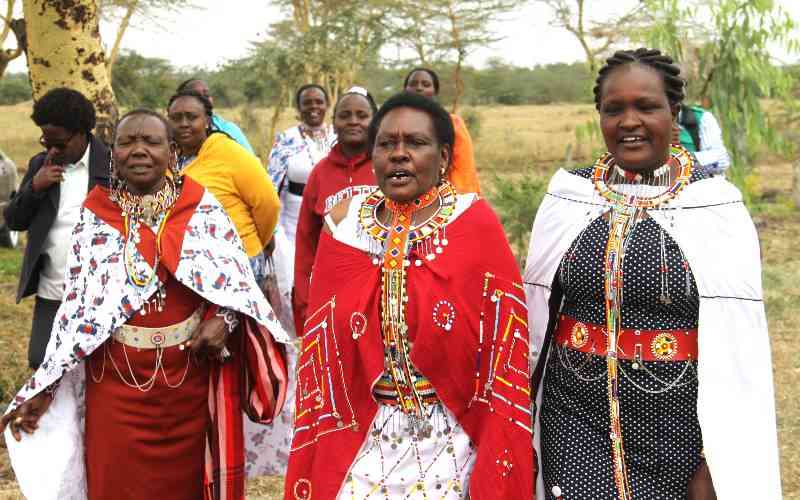Poor roads hinder healthcare access in Kajiado, say residents

[Peterson Githaiga/Standard]
Poor road infrastructure in Kajiado County has been cited as a major barrier to accessing healthcare, especially in rural areas during the rainy season.
Residents say that reaching health facilities becomes a nightmare when roads become impassable. However, they are being encouraged to embrace the Multi-sectoral Approach Health Program recently launched to improve health and living standards.
County Health CEC Alex Kilowua said the Saving Lives and Livelihoods (SLL) Program, developed in partnership with Africa CDC and the Mastercard Foundation, is aligned with the county’s Integrated Development Plan (2023–2027). He urged locals to support the initiative.
Speaking in Kajiado town after receiving a delegation from Africa CDC and Mastercard Foundation—who are in the country to evaluate ongoing projects—Kilowua noted that many residents have already benefited from the program.
He emphasized the importance of a multi-sectoral approach and reaffirmed the county’s commitment to supporting the initiative, which integrates human health, environmental services, veterinary care, and agriculture.
“The aim of this initiative is to strengthen health systems for long-term impact and to support the National Public Health Institute in fulfilling its mandate. We want to build a strong foundation so that, even when partners leave, we can sustain the gains,” said Kilowua.
He added that through the program, the county government has enrolled new Community Health Promoters (CHPs) to help expand the reach of Universal Health Coverage (UHC).
“The promoters have been equipped with tools to conduct preliminary tests before referring patients to hospitals for further treatment,” he said.
According to Rahab Amana of Africa CDC’s Nairobi office, the joint initiative with Kajiado County has been crucial in the COVID-19 response.
She said Phase I of the project focused on expanding vaccine access, improving health security, and building long-term capacity to handle future pandemics.
“Phase II will now focus on completing COVID-19 vaccination by integrating it into routine immunization, enhancing pandemic preparedness, and further strengthening institutional capacity at both national and continental levels,” Amana said.
Mary Mathenge, Project Manager at Amref Health Africa, said more than 5,110 health workers have been trained so far across Kajiado and Kitui counties, with over 4,000 residents reached through One Health talks.
“Over 5,000 school children have been educated on dog bite management, rabies symptoms, and prevention. We’re working to sustain the outreach efforts beyond the SLL program using SHA claims and other county resources,” Mathenge added.
She also appealed to the county government to improve road infrastructure to ensure easier access to health services.
Stay informed. Subscribe to our newsletter
“As we continue community engagement to promote positive health-seeking behavior and eliminate harmful practices like FGM, we urge the county to prioritize road improvements, especially for the rainy season,” said Mathenge.
You may also like...
Diddy's Legal Troubles & Racketeering Trial

Music mogul Sean 'Diddy' Combs was acquitted of sex trafficking and racketeering charges but convicted on transportation...
Thomas Partey Faces Rape & Sexual Assault Charges

Former Arsenal midfielder Thomas Partey has been formally charged with multiple counts of rape and sexual assault by UK ...
Nigeria Universities Changes Admission Policies

JAMB has clarified its admission policies, rectifying a student's status, reiterating the necessity of its Central Admis...
Ghana's Economic Reforms & Gold Sector Initiatives

Ghana is undertaking a comprehensive economic overhaul with President John Dramani Mahama's 24-Hour Economy and Accelera...
WAFCON 2024 African Women's Football Tournament

The 2024 Women's Africa Cup of Nations opened with thrilling matches, seeing Nigeria's Super Falcons secure a dominant 3...
Emergence & Dynamics of Nigeria's ADC Coalition

A new opposition coalition, led by the African Democratic Congress (ADC), is emerging to challenge President Bola Ahmed ...
Demise of Olubadan of Ibadanland
Oba Owolabi Olakulehin, the 43rd Olubadan of Ibadanland, has died at 90, concluding a life of distinguished service in t...
Death of Nigerian Goalkeeping Legend Peter Rufai

Nigerian football mourns the death of legendary Super Eagles goalkeeper Peter Rufai, who passed away at 61. Known as 'Do...




